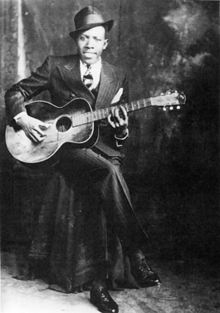Robert Johnson
| Robert Johnson | |
|---|---|

Studio portrait (ca. 1935), one of only two or three verified photographs of Johnson
|
|
| Background information | |
| Birth name | Robert Leroy Johnson |
| Born |
May 8, 1911 Hazlehurst, Mississippi, U.S. |
| Died | August 16, 1938 (aged 27) Greenwood, Mississippi, U.S. |
| Genres | Delta blues |
| Occupation(s) | Musician, singer, songwriter |
| Instruments | Guitar, vocals, harmonica |
| Years active | 1929–1938 |
| Notable instruments | |
| Gibson L-1 | |
Robert Leroy Johnson (May 8, 1911 – August 16, 1938) was an American blues singer-songwriter and musician. His landmark recordings in 1936 and 1937 display a combination of singing, guitar skills, and songwriting talent that has influenced later generations of musicians. Johnson's shadowy and poorly documented life and death at age 27 have given rise to much legend. One Faustian myth says that he sold his soul to the devil at a local crossroads of Mississippi highways to achieve success. As an performer who played mostly on street corners, in juke joints, and at Saturday night dances, Johnson had little commercial success or public recognition in his lifetime.
After the reissue of his recordings in 1961, on the LP King of the Delta Blues Singers, his work reached a wider audience. Johnson is now recognized as a master of the blues, particularly of the Mississippi Delta blues style. He is credited by many rock musicians as an important influence; the blues and rock musician Eric Clapton has called Johnson "the most important blues singer that ever lived."
Johnson was inducted into the Rock and Roll Hall of Fame in its first induction ceremony, in 1986, as an early influence on rock and roll. In 2010, David Fricke ranked Johnson fifth in Rolling Stone magazine's "100 Greatest Guitarists of All Time".
Johnson was born in Hazlehurst, Mississippi, possibly on May 8, 1911, to Julia Major Dodds (born October 1874) and Noah Johnson (born December 1884). Julia was married to Charles Dodds (born February 1865), a relatively prosperous landowner and furniture maker, with whom she had ten children. Charles Dodds had been forced by a lynch mob to leave Hazlehurst following a dispute with white landowners. Julia left Hazlehurst with baby Robert but after two years sent the boy to Memphis to live with her husband, who had changed his name to Charles Spencer.
...
Wikipedia
